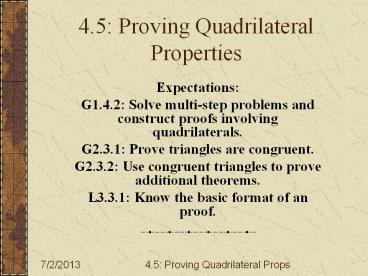4.5: Proving Quadrilateral Properties - PowerPoint PPT Presentation
1 / 13
Title:
4.5: Proving Quadrilateral Properties
Description:
4.5: Proving Quadrilateral Properties Expectations: G1.4.2: Solve multi-step problems and construct proofs involving quadrilaterals. G2.3.1: Prove triangles are ... – PowerPoint PPT presentation
Number of Views:378
Avg rating:3.0/5.0
Title: 4.5: Proving Quadrilateral Properties
1
4.5 Proving Quadrilateral Properties
- Expectations
- G1.4.2 Solve multi-step problems and construct
proofs involving quadrilaterals. - G2.3.1 Prove triangles are congruent.
- G2.3.2 Use congruent triangles to prove
additional theorems. - L3.3.1 Know the basic format of an proof.
2
- In the figure below, AC is the diameter of the
circle, B is a point on the circle, AB is
congruent to BC and D is the midpoint of AC. What
is the degree measure of angle ABD? - 30
- 45
- 60
- 90
- Cannot be determined from the given
information
3
Kites
- Defn A quadrilateral is a kite iff it has 2
distinct pairs of adjacent and congruent sides.
4
Anatomy of a Kite
Ends Vertices where the congruent sides
intersect.
5
Anatomy of a Kite
The diagonal of a kite with its endpoints at the
ends of the kite is the symmetry diagonal for the
kite.
6
Properties of a Kite Theorem
- If a quadrilateral is a kite, then
- The symmetry diagonal bisects the angles at the
ends of the kite. - Its diagonals are perpendicular.
7
Prove part a of the Properties of a Kite Theorem
Given ABCD is a kite. Prove AC bisects ?DAB
and ?DCB
D
A
C
B
8
Properties of a Parallelogram Theorem
- If a quadrilateral is a parallelogram, then
- Each diagonal forms 2 congruent triangles.
- Both pairs of opposite angles are congruent.
- Each pair of opposite sides are congruent.
- Diagonals bisect each other.
- Consecutive angles are supplementary.
9
Properties of a Parallelogram Theorem
- Prove part a.
- Given ABCD is a parallelogram.
- Prove ?ABC ??CDA
C
B
A
D
10
Properties of a Rhombus Theorem
- If a quadrilateral is a rhombus, then
- It is a parallelogram and a kite.
- Its diagonals are perpendicular.
- Its diagonals bisect opposite angles.
11
Properties of a Rectangle Theorem
- If a quadrilateral is a rectangle, then
- It is a parallelogram.
- Its diagonals are congruent.
12
Properties of a Square Theorem
- If a quadrilateral is a square, then
- It is a parallelogram, rectangle, rhombus and
kite. - Its diagonals are perpendicular, congruent, they
bisect each other and they bisect the angles at
opposite ends of the square.
13
Assignment
- Pages 248-249, 42-66 (all)































